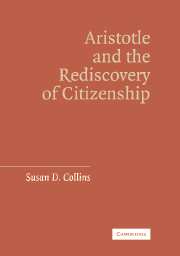Book contents
- Frontmatter
- Contents
- Acknowledgments
- Aristotle and the Rediscovery of Citizenship
- Introduction: The Rediscovery of Citizenship
- 1 Liberal Citizenship and Aristotle's Ethics
- 2 Citizen Virtue and the Longing for the Noble
- 3 Justice as a Virtue
- 4 Prudence, the Good Citizen, and the Good Life
- 5 Citizenship and the Limits of Law
- 6 Political Wit and Enlightenment
- Conclusion: Aristotle and the Rediscovery of Citizenship
- Bibliography
- Index
Conclusion: Aristotle and the Rediscovery of Citizenship
Published online by Cambridge University Press: 17 July 2009
- Frontmatter
- Contents
- Acknowledgments
- Aristotle and the Rediscovery of Citizenship
- Introduction: The Rediscovery of Citizenship
- 1 Liberal Citizenship and Aristotle's Ethics
- 2 Citizen Virtue and the Longing for the Noble
- 3 Justice as a Virtue
- 4 Prudence, the Good Citizen, and the Good Life
- 5 Citizenship and the Limits of Law
- 6 Political Wit and Enlightenment
- Conclusion: Aristotle and the Rediscovery of Citizenship
- Bibliography
- Index
Summary
For Hobbes, there is nothing “more repugnant to government” or “more ignorantly” said than much of Aristotle's Politics and Ethics. But it does not take such sharp wit to discern the tension between Aristotle's thought and a liberal tradition that prizes the freedom of each to pursue happiness as he or she sees fit. Indeed, one of the aims of this tradition has been to liberate the individual from the kind of religious authority and sectarian strife for which Hobbes blamed the “ghostly” Aristotelianism of his time. As Rawls notes, liberalism emerges as the solution to the problem of creedal and salvationist religions, and it is with a view to solving this problem for the sake of future peace that, in response to the attacks of September 11th, we are now attempting to remake the world in our image. Given the political goods of liberalism, then, perhaps we should simply abandon Aristotle's political philosophy, as Hobbes advises, or reformulate it to make it consistent with the democratic pluralism of our age, as some scholars today urge. I have argued, to the contrary, that it is precisely because Aristotle does not share liberal presuppositions that his thought becomes useful to us. In particular, by exploring dimensions of the moral and political world that we neglect or obscure, he illuminates the question central to his political philosophy and before us once again: What is a citizen?
- Type
- Chapter
- Information
- Aristotle and the Rediscovery of Citizenship , pp. 166 - 178Publisher: Cambridge University PressPrint publication year: 2006



